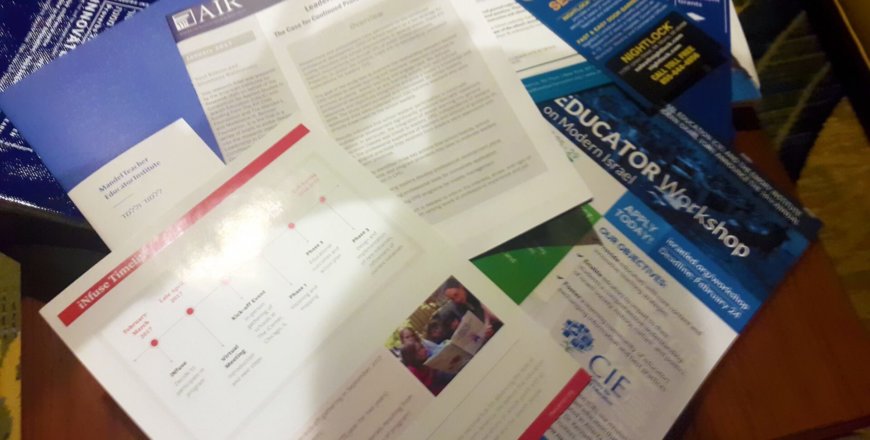
What We Saw and Heard at Prizmah 2017
The inaugural Prizmah Jewish Day School Conference brought together more than 1,000 day school educators and education leaders for three days of learning and sharing educational best practices. We were excited to play a role in this learning process and to contribute to Prizmah at such a formative moment in the organization’s trajectory (since summer 2016, Rosov Consulting has been working with Prizmah to help coach staff from different legacy organizations, as they refer to themselves, so they can learn to do their best work together). It was especially gratifying to see the number of organizations that support the day school field that are in turn supported by the efforts of the team at Rosov Consulting.
At the conference, Pearl Mattenson, Director at Rosov Consulting, was a facilitator at the lay leader breakfast, working with Yossi Prager, Executive Director of The AVI CHAI Foundation, to help day school board members think creatively about their role in supporting the Jewish mission of their school. Additionally, along with Jack Wertheimer, Alex Pomson, Rosov Consulting’s Managing Director, participated in the conference panel Why Hebrew? What Story are You telling? The conversation centered on the soon-to-be-released report on Hebrew language study in day schools around the country–including analysis on areas for improvement. Gary Rosenblatt, Editor-in-Chief of The New York Jewish Week, said that the session “challenged conventional thinking” as we “dealt with the rationale for teaching Hebrew.” Here’s what heads of schools that participated in the study had to say:
We are very appreciative of the opportunity to participate in the Hebrew language study and to shine a light on our Hebrew instruction in school. The comparison to similar schools helped affirm some common attitudes and perceptions across like-minded schools as well as highlighting some important areas of deviation that will allow us to reflect in a focused way on these areas.
I was struck by the predominant consistency between our school and the comparison group in most categories of the report, including ones in which students, parents and staff differed noticeably. While the deviations focus our attention on what we might be doing particularly well or poorly, the similarities allow us to identify broader trends among parents, students and staff and consider the implications.
The study did a nice job capturing perceptions…much more information is needed to correlate perceptions with actual achievement by the students and we are looking forward to a future study that might be able to capture that correlation.
– Joshua Levisohn, Ph.D, Head of School, Melvin J. Berman Hebrew Academy
The report was fascinating to administration and staff at our school. We were glad to see that although we are quite far from the centers of Jewish education on the east coast, the perception, enthusiasm, and value that our community holds for the instruction of Ivrit both as a modern current language, as well as our heritage language for ancient texts are highly positive, and that Ivrit instruction and acquisition is held in high esteem as an inherent value and as an important building block of Jewish identity…The report was eye opening and helpful and will serve as an important artifact in our constant attempt to collect and analyze data to support our educational endeavors.
– Tamar Friedman, Director of Judaic Studies, Hillel Torah North Community Day SchoolParticipation in the Hebrew at the Heart of the Jewish Day School study afforded us the opportunity to reflect on aspects of our Hebrew program that might otherwise have remained hidden. The results were encouraging of our ongoing efforts to improve Hebrew teaching and learning and helped us identify new areas for enrichment.
– Benjamin Mann, Head of the Middle School and Jewish Studies Coordinator, Solomon Schechter School of Manhattan
Now, with the conference concluded, we are fielding the post-conference survey to all participants, as well as a survey to staff. We look forward to analyzing the results in early March.




